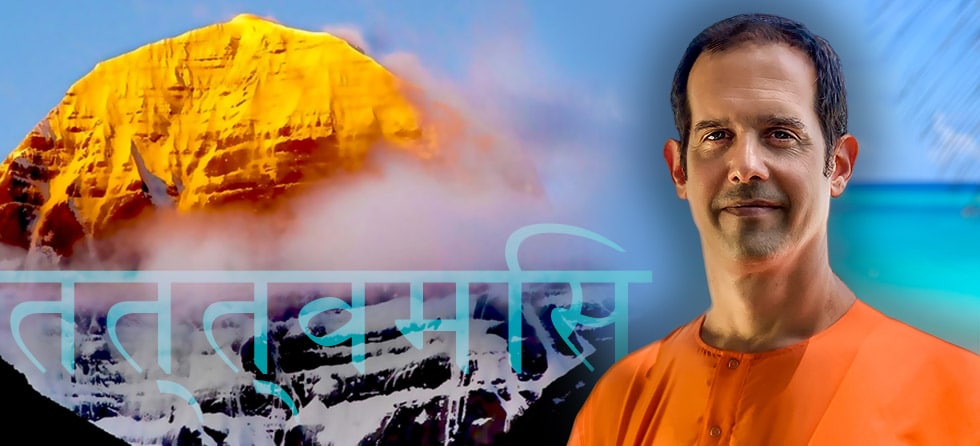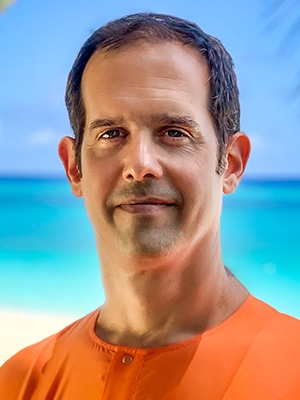
Vedanta: Teachings from the Upanishads on the Essential Freedom of the Self
8 WEEKLY SESSIONS, Fridays, 7:00-8:30pm EST
Program Type: Online Course
Date & Time: Offered as 8 weekly sessions on Fridays, Dec 4, 11, 18, 25, Jan 1, 8, 15, & 22, 7:00-8:30pm EST
Hours: 12 hours
What you’ll learn:
- The Vedantic teachings about the inherent freedom of the self and its identity with the supreme reality with direct teachings from the Upanishads and the Bhagavad Gita
- The Vedantic analogies or Nyayas
- The method of Abheda Bhoda Vakhya or negation of names and forms
- The analysis and contemplation of the Tat Twam Asi declaration
Course description:
The oneness of all existence is the message which Vedanta teaches. The Upanishads form the basis of Vedanta. It is the science that raises us above the plane of bondage and suffering and shows the path to freedom. Vedanta reveals the essential nature of the self which is ever free and blissful. The study of Vedanta frees us from all limiting ideas about oneself and the world.
Course contents:
- Lesson 1: The nature of bondage and its cause, freedom from bondage and its means:
- Samsara and the Karma bandha or bondage of karma
- The process of bondage:
- Avidya – ignorance
- Adhyasa – superimposition of the Atma and Anatma or Self and non-Self.
- Adhyaroopa – superimposition of the limitations of the mind and the body on the Self.
- Ahamkara – egoism – the limited sense of Self.
- Karma – desires, actions and their fruits as pleasure and pain.
- Three types of Karma:
- Sanchita or accumulated karma
- Prarabdha or present life karma
- Agami karma or fresh karma
- Analysis of the goals of life.
- Lesson 2: The four means of liberation and Vedantic sadhana of self inquiry:
- Viveka – discrimination
- Vairagya – dispassion
- Sat Sampat – Six virtues related to mind control
- Mumukshutva – Intense longing for liberation
- Vicharana or self-inquiry:
- Sravana – listening.
- Manana – reflecting
- Nididhyasana – deep meditation of the Self.
- Lesson 3: Brahman or ultimate reality – its essential nature and its being the foundation of the individual and creation:
- Swaroopa lakshanam: the essential nature of Brahman as Satyam Jnanam Anantam (existence, knowledge and infinitude).
- Brahman being the foundation of the individual.
- Brahman being the foundation of creation.
- Lesson 4: Maya and the projection of the world-appearance:
A study of the process of Adhyaroopa or superimposition by which creation appears real. - Lesson 5: Ignorance, superimposition and the five sheaths:
A study of how false identity emerges with the five sheets and the process of negation or neti – neti:- Annamaya kosha – food sheath.
- Pranamaya kosha – vital sheath.
- Manomaya kosha – mental sheath.
- Vijnanamaya kosha – intellect sheath.
- Anandamaya kosha – bliss sheath.
- Lesson 6: The Vedantic proclamations of the highest truth – part 1:
- Prajnanam brahma – Consciousness is Brahman.
- Aham brahmasmi – I am Brahman.
- Tattvamasi – That thou art.
- Lesson 7: The Vedantic proclamations of the highest truth – part 2:
- Ayam atma brahma – This Atman is Brahman.
- Sarvam khalvidam brahma – All this, indeed, is Brahman
- Lesson 8: The nature of the Jnani or knower of the Self.
Additional Information:
This program is offered live through Zoom webinar with the availability for students to interact through Q&A with the presenter.
For enrolled students, a video recording will be available after each class in the event you miss a class or would like to review the content.
It is possible to register and take the course at any time. You can catch up on any classes you miss with the recordings.
Requirements & Recommendations:
- No experience necessary. This program is open to beginners as well as advanced practitioners.
- Viewing Device: Desktop or laptop computer will provide the best experience, although you can also connect via a tablet or smartphone.
- Internet connection: High-speed broadband wired or wireless is best.
- Video: Download Zoom to your computer, or install the Zoom app to your device. For interactive group sessions, a webcam or integrated camera will allow others to feel more connected with you.
- Audio: Headphone speakers are recommended. If you wish to participate vocally, a headset with a microphone will be ideal.
Course Includes:
- 12 hours on-demand video
- Downloadable course manual

Swami Brahmananda is Manager of the Sivananda Ashram Yoga Retreat and senior staff of the Sivananda organization. A long-time practitioner of yoga, he regularly teaches yoga philosophy and meditation for the Sivananda Yoga Teacher Training Courses as well as meditation immersion courses. He is a much-loved, inspiring, and knowledgeable teacher.
Let's Stay In Touch
Join our email list to learn more about our in-person and online programs, courses, and free events.







